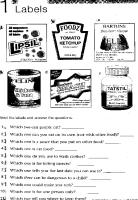Sociolinguistics Test
STUDENT’S NAME: …………………… Reg. No……………. Class…….. HCMC University of Education Department of English Sociolinguistics Te
Views 113 Downloads 39 File size 37KB
Recommend stories
- Author / Uploaded
- ruoimama
Citation preview
STUDENT’S NAME: …………………… Reg. No……………. Class……..
HCMC University of Education Department of English Sociolinguistics Test
Chöõ kyù giaùm thò 1:………………. Chöõ kyù giaùm thò 2: ……………… ……………………………………………………………………………………………………… PART 1: TICK THE ANSWER OF YOUR CHOICE. TRUE
FALSE
1. A language, say English, is really a collection of dialects. 2. What is considered standard is associated with prestige, a non-linguistic factor. 3. People tend to use more vernacular forms to those they don’t know well, and more standard forms to their friends. 4. Dialect is not synonymous with accent. 5. When language shift occurs, it does not always shift towards the language of the dominant powerful group. 6. Language loss has occurred when a language is no longer spoken naturally anywhere in the world. PART 2: CHOOSE CORRECT ANSWERS FOR THE FOLLOWING STATEMENTS. 1 . The three essential criteria which characterize Standard English are: a. prestigious variety, codification and stabilization, H functions b. linguistic merits, H functions, codification c. H functions, L functions, codification d. linguistic merits, L functions, cultural acceptability 2. No one uses a. H for everyday interaction b. L for everyday interaction c. both H and L for everyday interaction d. all of the above 3. In countries like England, Australia, New Zealand and the United States, one of the first domains in which children of migrant families meet English is a. the religion b. the school c. the workplace d. all of the above 4. Besides economic, social and political factors, demographic factors are also relevant in accounting for a. the speed of language shift of a community b. the code-choice of a community c. the language death of a community d. all of the above 5. The German speaking part of Switzerland where the H-variety (a form of standard German) and the L-variety (a range of regional Swiss dialects) coexist can be referred to as a. a case of polyglossia c. a case of multilingualism b. a case of diglossia d. a case of monolingualism 6. The following utterance of a German immigrant in Australia “ Das handelt von einem secondhand dealer and his son.” can be a. an example of diglossia b. a polyglot c. an example of bilingualism d. an example of code-switching 7 The different kinds of institutional support which can be sought by a community of people who want to maintain their minority language within a society where English is the language of the majority are a. the use of the minority language in places of worship b. the use of the minority language in education and in the media c. the right to use the language in court, in dealing with government officials d. all of the above.
1
PART 3: USE AN APPROPRIATE WORD OR PHRASE TO COMPLETE THE FOLLOWING SENTENCES. 1. Diglossia is a characteristic of ………………. communities rather than individuals. 2. Language ………… is a situation where speakers continue to use a language even when there is a new language available. 3. Unlike pidgin, ………………………… have large numbers of native speakers. 4. When a dialect is characteristic of a given region, it is called a regional ………... PART 4: BRIEFLY ANSWER THE FOLLOWING QUESTIONS. 1. What is the difference between language death and language loss? ………………………………………………………………………………………………………….. ………………………………………………………………………………………………………….. ………………………………………………………………………………………………………….. ………………………………………………………………………………………………………….. ………………………………………………………………………………………………………….. ………………………………………………………………………………………………………….. ………………………………………………………………………………………………………….. ………………………………………………………………………………………………………….. ………………………………………………………………………………………………………….. 2. What are the factors which seem to contribute to language shift? ………………………………………………………………………………………………………….. ………………………………………………………………………………………………………….. ………………………………………………………………………………………………………….. ………………………………………………………………………………………………………….. ………………………………………………………………………………………………………….. ………………………………………………………………………………………………………….. ………………………………………………………………………………………………………….. ………………………………………………………………………………………………………….. ………………………………………………………………………………………………………….. 3. What are the factors which seem to contribute to language maintenance? ………………………………………………………………………………………………………….. ………………………………………………………………………………………………………….. ………………………………………………………………………………………………………….. ………………………………………………………………………………………………………….. ………………………………………………………………………………………………………….. ………………………………………………………………………………………………………….. ………………………………………………………………………………………………………….. ………………………………………………………………………………………………………….. ………………………………………………………………………………………………………….. ………………………………………………………………………………………………………….. ………………………………………………………………………………………………………….. …………………………………………………………………………………………………………..
2









